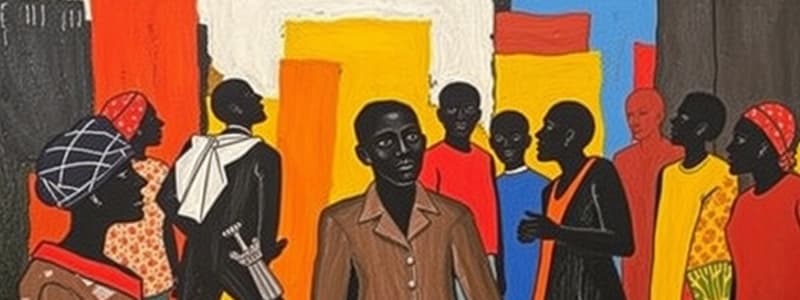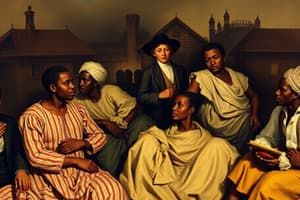Podcast
Questions and Answers
What is the primary goal of an abolitionist?
What is the primary goal of an abolitionist?
- To eliminate a practice, such as slavery. (correct)
- To promote the expansion of slavery.
- To reform the practice of slavery.
- To regulate the slave trade.
The abolitionist movement in America gained momentum around what time period?
The abolitionist movement in America gained momentum around what time period?
- 1829-1850 (correct)
- 1900-1920
- 1600-1620
- 1750-1770
What event influenced the beginning of the American abolitionist movement?
What event influenced the beginning of the American abolitionist movement?
- The French Revolution.
- The start of the American Revolution.
- The abolishment of slavery in Great Britain. (correct)
- The Louisiana Purchase.
Which of the following actions did abolitionists undertake to further their cause?
Which of the following actions did abolitionists undertake to further their cause?
Which religious groups were largely in agreement with the movement to abolish slavery?
Which religious groups were largely in agreement with the movement to abolish slavery?
Flashcards
What is an Abolitionist?
What is an Abolitionist?
Someone who wants to eliminate a practice, especially slavery in the past or capital punishment now.
Who was Frederick Douglass?
Who was Frederick Douglass?
A former slave who became a prominent activist, writer, and public speaker against slavery.
Who was Harriet Beecher Stowe?
Who was Harriet Beecher Stowe?
An abolitionist who wrote 'Uncle Tom's Cabin,' a novel highlighting the mistreatment of slaves.
Who was Harriet Tubman?
Who was Harriet Tubman?
Signup and view all the flashcards
Who was Sojourner Truth?
Who was Sojourner Truth?
Signup and view all the flashcards
Study Notes
- An abolitionist is someone who wants to eliminate a practice, such as slavery or capital punishment.
- The most significant abolitionist movement in American history occurred from 1829-1850.
- Abolitionists believed slavery was disgraceful and weakened the United States.
- They petitioned Congress, sought political office, and distributed literature to show the South the wrongs of slavery.
- The movement was influenced by Great Britain's abolition of slavery.
- Opposition to the slave trade existed as early as the 16th century.
- The American Colonization Society, formed in 1816, aimed to free slaves and return them to Africa, leading to conflict between pro- and anti-slavery groups.
- The abolitionist movement contributed to the Civil War and the extension of voting rights to Black men.
- The Civil War was caused by a power struggle between the North and South.
- President Lincoln called for the freeing of slaves in rebelling areas.
- Abolitionists included former slaves, former slave owners, Quakers, and Baptists.
- The Second Great Awakening, a religious movement, influenced abolitionism.
- Many abolitionists were women who became influential in the women's rights movement.
Famous Abolitionists:
- David Walker
- William Lloyd Garrison
- Frederick Douglass
- Henry Highland Garnet
- Harriet Beecher Stowe
- Harriet Tubman
- Sojourner Truth
David Walker:
- In 1829, Walker wrote a pamphlet denouncing slavery and encouraging slaves to fight for their freedom.
- He wanted to instill pride in Black people and give them hope.
- Walker's pamphlet inspired resistance among Southern slaves.
- Slave owners were angered by his influence and sought his death.
- He refused to flee to Canada despite the danger.
- Walker quote: "America is more our country than it is the whites...The greatest riches in all America have arisen from our blood and tears."
William Lloyd Garrison:
- Garrison began publishing an abolitionist paper called 'The Liberator' in 1830.
- He helped New England form the New England Anti-Slavery Society.
- Garrison criticized the Constitution for being pro-slavery.
- Garrison quote: "Be faithful, be vigilant, be untiring in your efforts to break every yoke, and let the oppressed go free."
Frederick Douglass:
- Douglass escaped slavery and became an influential activist, writer, and speaker.
- He taught himself to read and write and helped other slaves do the same.
- Douglass urged President Lincoln to abolish slavery.
- Douglass quote: "Why am I called upon to speak here today? What have I, or those I represent, to do with your national independence? Are the great principles of political freedom and of natural justice embodied in that Declaration of Independence extended to us?"
Henry Highland Garnet:
- Garnet advocated for a militant approach to ending slavery.
- He traveled around England, speaking against slavery and supporting Black people's freedom.
- Garnet quote from his 'Call to Rebellion' speech in 1843: "Let every slave throughout the land do this, and the days of slavery are numbered."
Harriet Beecher Stowe:
- Stowe wrote 'Uncle Tom's Cabin,' a novel exposing the evils of slavery.
- She gathered firsthand accounts from slaves about their mistreatment.
- Her book angered the South, which defended slavery.
- Stowe quote: "The longest way must have its close - the gloomiest night will wear on to a morning."
Harriet Tubman:
- Tubman escaped slavery and helped other slaves gain their freedom.
- She served in the military.
- Tubman quote: "Slavery is the next thing to hell."
Sojourner Truth:
- Truth helped slaves escape via the Underground Railroad.
- She encouraged Black people to be hardworking and valuable to avoid exploitation.
- Truth was a writer and public speaker who advocated for freedom.
- Truth quote: "Ain't I a Woman," delivered at a Women's Rights Convention in 1851.
Studying That Suits You
Use AI to generate personalized quizzes and flashcards to suit your learning preferences.




